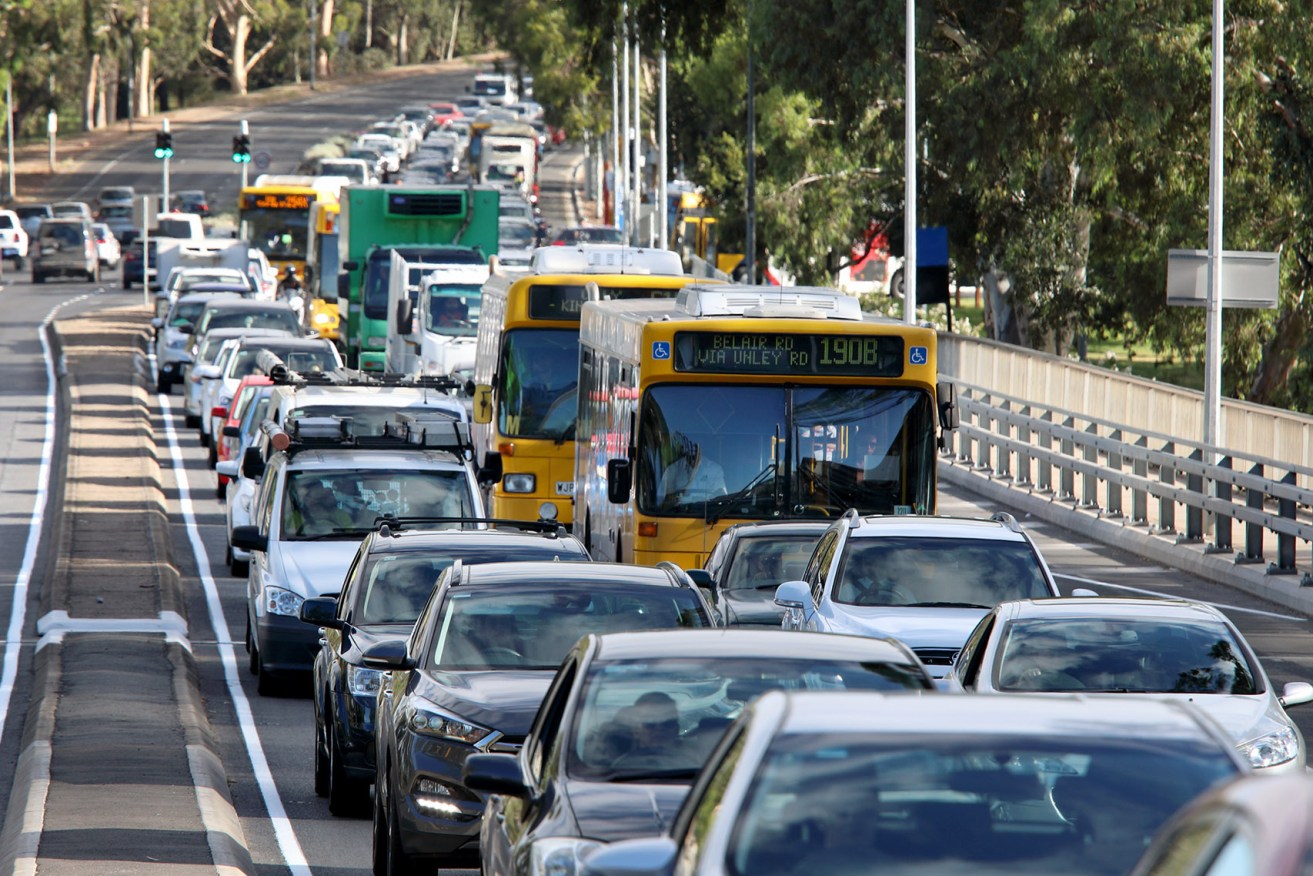Cars and roads rule as public transport kicked to kerb
The state budget’s billions for the South Road upgrade represents another lost opportunity to invest in public transport and get more cars off the streets, argues Craig Wilkins.

Photo: Tony Lewis / InDaily
Back in 2017, South Australia created headlines around the world when we built the world’s biggest battery.
It was such a big deal that Elon Musk himself flew into town for the announcement.
Our state’s already excellent global reputation as a genuine leader in clean energy transition flared brighter.
After this week’s state budget we are gathering worldwide headlines again.
However, this time the coverage is far less flattering.
In a surprise move, Treasurer Rob Lucas has announced a plan to install a world-first road user charge on electric vehicles.
While just about everywhere else on the planet is reducing taxes and charges to encourage an uptake in electric cars, our state has decided to slow it down by making it more expensive.
Yet just a few days prior, the Premier and Environment Minister had announced an $18 million package for new charging stations to fast-start the uptake of electric vehicles.
As any learner driver knows, you don’t get very far with one foot on the accelerator and the other on the brake.
This mixed messaging is symptomatic of a broader lack of transport vision for our city and state.
Despite Tuesday’s budget containing the ‘biggest public infrastructure program in our state’s history’ there was a striking lack of new investment in public transport. Again.
Or any focus on cycling or pretty much any other type of transport infrastructure apart from building roads.
Lots of them. A $6.9 billion bitumen bonanza over the next 4 years.
And that doesn’t even include the centre piece of the budget – a minimum outlay of an eye-watering $8.9 billion on just one strip – South Road.
With the apparent joy of driving non-stop from Noarlunga to Gawler (why stop there – surely Goolwa to Gawler has a snazzier ring?) this project will entrench our city’s car dependence for decades to come.
And despite the claims, it will not reduce congestion.
Ask any traffic engineer: bigger roads just encourage more car use.
We are stuck in an endless cycle that has only one outcome: more traffic jams, more frustration, more pollution and the further scarring of our city like the brutally ugly concrete monolith that is the Darlington interchange.
But the overwhelming obsession to ‘complete’ South Road has an even more concerning legacy: it will suck up every bit of money and attention from our state’s transport department for the next decade.
And the biggest loser will be public transport.
Unlike most other transport choices, public investment is essential for public transport. Only the Government can do it.
On pretty much every measure, moving people by trains, trams and buses is superior.
It’s more efficient. We get less traffic snarls, freeing up space for freight vehicles. There is less smog, reducing hospital admissions. Property values increase, and so does productivity. Our streets become cleaner, quieter and calmer.
There is also a huge social uplift as movement options increase for those who cannot drive or can’t afford a car, especially the elderly.
Public transport is a shared experience when so much in our modern society pulls us apart. If you don’t believe me, try catching the train after a footy game, or the pageant, or the show, or any other major event.
And when every new project is sold as a post-COVID stimulus, public transport delivers more jobs per kilometre than road construction.
But perhaps most importantly of all, during peak periods, bus and rail produce up to six times less carbon pollution per passenger kilometre than private vehicles.
While wind and solar is reducing the energy share of our greenhouse emissions, carbon pollution from transport in SA is increasing at a rapid rate. In fact, transport is now our biggest contributor to global warming.
And - considering the world is on track to breach the bottom end of the Paris targets in as little as seven years – that is a massive problem.
We urgently need a coherent plan to turn this around.
Modern technology is throwing up an extraordinary array of smarter options.
Remember when autonomous vehicles were all the rage?
Or when Lord Mayor Sandy Verschoor ran on a platform of trackless trams?
(As a reminder of just how good trackless trams are, check out this video.)
For a fraction of the price of the South Road upgrade, we could have trackless trams across major corridors. And it could happen in a third of the time.
Our state’s leadership in household solar offers a massive opportunity to integrate electric vehicles with home battery storage.
We could shift all our buses to full electric tomorrow.
The technology is there. We have no shortage of smart people. We just need the commitment and the political will.
But technology alone is not enough. As well as sharpening up the alternatives, we need to have a much tougher conversation about how we make combustion engine car travel less of a default option.
COVID has started the conversation, with many people now working more from home.
There are many reasons why citizens in cities like London, New York or Melbourne choose public transport, but ultimately it comes down to a rational choice: it’s quicker, cheaper and easier.
For many people in Adelaide, that’s still not the case. And this week’s state budget will only make it worse.
We need to do the hard yards of transforming our city form with public transport at the heart.
It won’t be easy.
But the upside – a quieter, cleaner, more productive and less congested city – is surely worth it.
Craig Wilkins is chief executive of Conservation SA.




